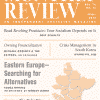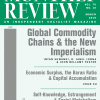
April 2019 (Volume 70, Number 11)
In the midst of the U.S.-directed coup attempt against the Bolivarian Republic of Venezuela in January–February, Donald Trump delivered a number of verbal attacks on socialism in Venezuela, Cuba, and Nicaragua. The immediate object was to justify U.S. attempts to overthrow the Bolivarian Republic. The less immediate, but hardly less important, goal was to tarnish the growing social democratic (self-styled democratic socialist) movement in the United States, associated with figures like Bernie Sanders and Alexandria Ocasio-Cortez. In order to safeguard their ambitious social-reform program, the new coterie of Democratic Party socialists have thus sought to separate themselves from Venezuela and other Latin American socialist states, presumably abandoning these countries to their fates at the hands of U.S. imperialism. This raises the historic question of social imperialism—a policy of social reform at home and imperial hegemony abroad. | more…

Searching for Alternatives in Eastern Europe
In the 1960s, Georg Lukács—under the slogan Back to Marx!—called for a “renaissance” of Marxism within Eastern Europe. To understand the nature of this renaissance, we have to understand the many important questions that the Hungarian uprising of 1956 raised for the anti-Stalinist left inside Hungary and Eastern Europe more broadly. This interview looks at efforts to rethink the future of socialism from the Eastern European situation in the second half of the twentieth century, including the political lessons of 1968, the internal fight within the Hungarian Socialist Party, and the continued relevance of V. I. Lenin’s Marxism. | more…

Crisis Management in South Korea and the Hegemonic Strategy of the Chaebols
In the Republic of Korea, chaebols—diversified and large-scale conglomerate forms of capital governed dynastically by an owner and the owner’s family—have grown quickly, dominating the Korean market and substantially contributing to the Korean economy since their structuring in the 1970s. Some chaebol affiliates have grown into global economic powers within a mere thirty to forty years. However, the fast growth of the chaebols in Korea has also been associated with crises and in trying to manage these crises chaebols have not only changed the ways in which they accumulate capital, they have sought to establish hegemony over civil society. | more…

The Debs Way

Owning Financialization
In the Notes from the Editors of the January 2019 issue of Monthly Review, the editors commented on a blog post by Michael Roberts on the term financialization. In the first part of this short exchange Roberts questions whether financialization is a meaningful and useful term, or simply a distraction from a comprehensive critique contemporary capitalism. | more…

The Critique of Financialization
There has been a tendency within liberal analysis of financialization to place an emphasis on the trees, that is, the various speculative mechanisms, rather than the forest, or the growth of finance in relation to production. The reason for this stress on the trees rather than the forest is that, in contemporary capitalist ideology, financialization cannot be brought seriously into question since it is part of the entire architecture of accumulation. | more…

Germany’s Hidden Social Crisis
Germany is commonly perceived as a strong, dependable island amid a sea of gyrating European uncertainties, a down-to-earth, dependable ally in attempts by the better U.S. presidents to move the world forward as steadily as possible. For the past thirteen years, this view has been personified in the clear, undramatic words and deeds of Angela Merkel, Chancellor of Germany since 2005. Considerable doubts in this appraisal, with evidence that Germany, like every other country, has never been a monolith free of class conflict and other contradictions, are addressed in Oliver Nachtwey’s Germany’s Hidden Crisis: Social Decline in the Heart of Europe, out now from Verso Books. In describing West German, then all-German, developments from the end of the Second World War until the present, Nachtwey analyzes from the left, unafraid to utilize the ideas of Karl Marx as well as a host of more recent analysts of many shades. | more…

Read Revolting Prostitutes
Revolting Prostitutes reminds readers that this struggle is at once bigger than any one sex worker’s immediate needs, but also must be precisely driven by these day-to-day needs. While this might at first seem contradictory, the book emphasizes how the collective workforce is constituted by individual workers with varied experiences, all of which are unique and valid. Narrative matters and, with Revolting Prostitutes, we are gifted one shaped by nuanced, considerate, care-informed members of the impacted working community. | more…

March 2019 (Volume 70, Number 10)
The present ongoing coup attempt organized in Washington is simply the latest in a series of such attempts by the U.S. government to overthrow the Bolivarian Republic of Venezuela over the last two decades. It can be seen as having three interrelated motives: (1) the destruction of Venezuelan socialism, (2) regaining control of Venezuela’s oil (the largest petroleum reserves in the world), and (3) reasserting U.S. hegemony over Latin America. | more…

Global Commodity Chains and the New Imperialism
To comprehend twenty-first-century imperialism we must go beyond analysis of the nation-state to a systematic investigation of the increasing global reach of multinational corporations or the role of the global labor arbitrage. At issue is the way in which today’s global monopolies in the center of the world economy have captured value generated by labor in the periphery within a process of unequal exchange, thus getting “more labour in exchange for less. The result has been to change the global structure of industrial production while maintaining and often intensifying the global structure of exploitation and value transfer. | more…

Economic Surplus, the Baran Ratio, and Capital Accumulation
In 1957, in the Political Economy of Growth, Paul Baran made a seminal contribution to our understanding of the connection between economic surplus—a concept he introduced into the development discussion—and growth. Given that the ruling class controls the surplus of society, how the surplus is used—whether it is invested, consumed, or simply wasted—is at its discretion. The effective utilization of surplus implies a reasonable rate of capital accumulation and economic development. In the following study of the utilization of surplus I compare the size of surplus and gross capital formation in a variety of countries starting from the mid–nineteenth century. | more…

Self-Knowledge, Estrangement, and Social Metabolism
Following two key themes in Karl Marx’s thought—estrangement and political economy, in their relation to human self-knowledge—labor mediates the social metabolism. In this schema, organic (or functional) metabolism is distinguished from extended metabolism (or social organization). Socially extended metabolism gives rise to shared values and concepts in the same way that organic metabolism gives rise to life. On this basis, I suggest that both the subject and object of human self-knowledge is a socially extended self, which can connect to itself only when humans freely participate in socially extended metabolism—that is, economy, science, and industry. Estrangement, in contrast, is seen to result from a disruption within socially extended metabolism. | more…

The Criminal Dimension of Climate Change
Unprecedented Crime, a book by Peter Carter and Elizabeth Woodworth, with a foreword by leading climate scientist James Hansen, outlines the criminality of those who actively promote the continuing emission of carbon gases into the atmosphere despite having full knowledge of the consequences. These consequences include the breakdown of large ice sheets, rising sea levels, and the intensification of extreme weather events around the world, such as hurricanes, floods, and fires. | more…